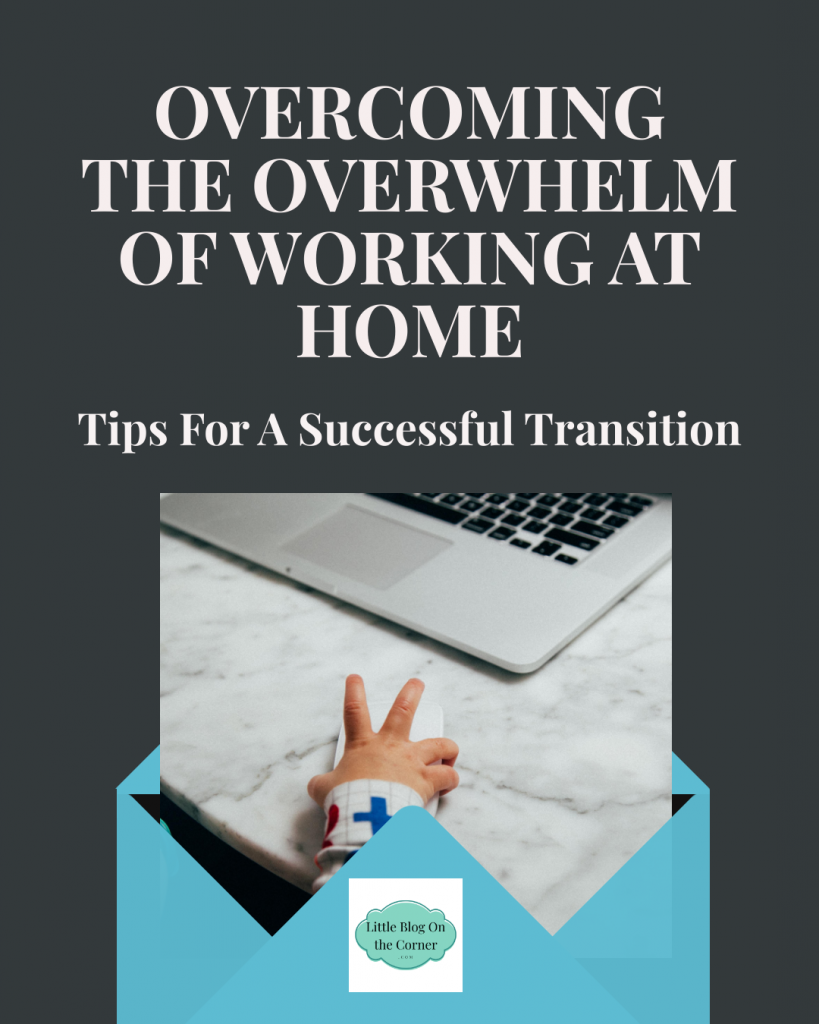WORKING AT HOME-OVERCOME THE OVERWHELM
Overcome The Overwhelm Of Working From Home– How to Make a Successful Transition

Change can be difficult especially if it’s unexpected. Many of us had one of those significant unexpected changes recently when our work environment shifted from the board room to a desk in the spare room.
There wasn’t a road map provided to help us maneuver through this new winding road. There was just an email with a heading that went something like, “Welcome to the new normal. If you can work from home, you will be working from home.”
So we took it upon ourselves to create our new normal while maintaining a semi-normal workflow and the same level of productivity.
It wasn’t necessarily easy but there were a few things that helped us make the transition easier. In order to make working from home actually work for us, we followed a few of the following tips. Hopefully, these tips will help you as well.
Tips For Working From Home

To be productive and actually get work done, we recommend the following:
- The first and most important thing you can do is to set up a dedicated workspace. If you want to actually get work done, you’ll have to have a home office or at least a workspace that includes a desk or table at which to work. I wrote an article recently outlining what you will need to set up a complete home office.
- Secondly, follow a schedule. Technically, you may not have a boss keeping track of your time but it’s still best to have a set start time and a set end time. It’s actually very easy to overwork and let work-life boundaries get too blurry when you don’t leave work behind at the end of the day. Of course, on the opposite side of that coin, it’s also easy to get sidetracked with household duties or social media or children or a thousand other distractions and end up losing all sense of time and never get anything done.
- If you have children, it’s true that you may have to have a flexible schedule but still, try to have set hours even if those hours are not 8 hours in a row. The structure will be beneficial for you and for your family, believe me. I personally try to be up, showered, dressed, and at my desk by 8 am or earlier. I also try to not work more than 9 hours a day.
- Next on our to-do list, is to take breaks. Make sure to take breaks just like you would if you were in the office! It’s easy to get lost in paperwork and conference calls and just keep going non-stop. However, that’s also a sure-fire way to burn out and burn out quickly. Take time during the day to get up and walk around, preferably once in the morning and once in the afternoon. And schedule in at least a 30-minute lunch break in the middle of the day. My employees say that during breaks they go out and walk a few laps around their yards or one employee says she takes a nature hike and walks down to a creek in her back yard and back on her break. Now, unfortunately, most of us don’t have a creek to walk to but regardless, it’s good practice to leave your desk for a few minutes, get some fresh air, and get a different perspective on your day. You’ll be able to focus better and be more productive if you take short breaks. If you need to, set a timer and make sure you take a full 15-minute break. If your days are extremely stressful, you might consider taking 15-minutes of meditation and deep breathing.
- Set and follow company expectations. Unfortunately, it’s not a vacation so remember you’re on company time and you still following company policy. In the long run, it will make your life peaceful and help you maintain employment.
- Check-in with co-workers regularly. Continue to have communication and collaborations between employees. Isolation can also be emotionally unhealthy and can lead to depression and decreased motivation. Spending a few minutes each day conversing with co-workers can be a great source of encouragement and inspiration and can help to keep your work environment a positive one.
- Utilize Teams 365, Zoom, Google Hangouts, Messenger Rooms, or other forms of video chats for meetings and conference calls. Our conversations used to be by phone. Now, we are having more video calls in order to be able to see each other’s faces and to be able to maintain connections with each other.
Working At HOme with children

Working when children are at home can be a challenge.
- If you have little ones at home, you may have to start your day before they wake up and work in segments of time around their schedules.
- Try to work on important projects first thing In the morning while children are sleeping, or when they are eating, napping, or involved in school work. I know a mom who had a designated quiet time for her children every day at exactly the same time. Her children knew they had to go to their rooms to read or play quietly for that period of time. It gave her a chance to get office work completed. It operated well for them and may work for you also if you want to give it a try.
- You can also consider setting up a daily movie time each day for the kiddos. I know screen time is not a good thing but you could allow them to watch one movie a day or a couple of children’s shows in the afternoon. Make sure to check out the shows prior to letting your children watch them. There are lots of programming out now that you might not want your children exposed to.
- Have children complete schoolwork or print out coloring and activity pages for them to work on while you are doing paperwork. It will make them feel like they are working just like mom.
- As we stated earlier, create a schedule and follow it even if you’re not working 8 or 9 hours in a row.
- Let family members know when you are working and that you cannot be interrupted when the office door is shut or you’re on a conference call or for specific periods of time unless there is an emergency.
- Type out your schedule and post it on the refrigerator so everyone knows your work hours!
- Also, because you have to feed everyone during the day, create a meal plan ahead of time to prevent spending an inordinate amount of time trying to find figure out what’s for lunch. Create a plan that includes easy meals that children can help make or consider cooking extra food each evening at dinner so you can serve leftovers for lunch the next day.
- And speaking of food, also plan out snacks in advance to avoid interruptions from hungry children. Have snacks ready and stored in specific, easy to access bins and containers.
- Use paper plates or anything that will make after lunch clean up faster and easier.
- Clean as you go to avoid messes that will cause stress later.
- And, last but not least, if possible, consider utilizing child care when you can so your children get to spend time with other little friends and they don’t have to feel like they are in competition for your attention.
Staying Productive While Working at Home

Set yourself up for success.
- Keep motivated by setting daily goals and weekly goals for yourself.
- Share your goals with team members and hold each other accountable.
- Eliminate distractions. Turn off email for a while each day and utilize apps that block social media sites. Distractions abound when working from home so you’ll have to have the motivation to keep yourself on task.
- The Pomodoro Technique is a great technique to use when you want to focus on a task.
- Utilize furniture that is comfortable. If you’re going to be working for hours on end, it will be worth the expense to trade in that hard kitchen chair for an ergonomic desk chair or consider investing in a standing desk.
- Have the supplies you need to get your work done. Make sure you have printer paper, printer ink, file folders, notebooks, on hand so important tasks aren’t held up due to a lack of supplies.
- For support, start or join a mastermind group to help you stay successful and motivated.
Managing Stress When Working From Home

Lastly, working from home brings its own stressors. Along with the good always comes some drawbacks.
- Working from home brings with it all sorts of problems with technology. So, avoid some of the stress that technology can bring by making it a point to become good friends with the IT guy/gal or have a friend you know you can call who will help out when you have technology questions. You’ll thank yourself in the long run.
- Studies show that people who work from home tend to work more hours than those who work in an office as they tend to “experience a blurring of boundaries between their home and work lives”. So, turn off your computer when the workday is over and walk away. It’s really easy to tell yourself it will only take a few minutes to finish up a task. But before you know it, those minutes can turn into hours.
- Unless you’re on a deadline, save the extra work for another day. You won’t be able to get back those hours that you worked on that late-night project that you should have spent with your family. Just like you leave work behind when you leave your office building, make your home office off-limits when you’re not on the clock.
- Have an after-work ritual that you do with your children that signals the end of your workday. Turn on some music. Take a walk around the block before starting to cook dinner. Have everyone start on evening chores like picking up toys and feeding the animals. Just make sure there is a clear stopping point. from work and a clear starting point to signal to yourself and your family that you are on family time.
- Set realistic expectations for yourself. Make self-care a priority and schedule time for activities that feed your mind and your spirit.
- Focus on activities that are life-giving. Turn off the news and social media if it causes you stress. Spend time reading the Word and other inspirational books and articles that give you hope.
Review

Reviewing what we have learned, working from home can be stressful if your work-life is bleeding into your personal life and visa versa. But there are ways to alleviate some of the stress.
- As previously stated, have a designated workspace so you can actually get work done.
- Follow a work schedule just like you would if you were still going to the office.
- Maintain daily contact with co-workers to avoid feeling isolated and help with motivation.
- Have open communication with your boss so you know what is expected of you and when projects are due.
- f you have little ones at home, you may have to start your day early in the morning while they are asleep and work in segments of time around their schedules.
- Try to work on important projects first thing In the morning while children are sleeping, or when they are eating, napping, or involved in school work.
- Keep motivated by setting daily goals and weekly goals for yourself.
- Focus on activities that are life-giving. Turn off the news and social media if it causes stress. Spend time reading inspirational materials that give you hope.
If you follow some of the tips provided in this article, I promise you will be able to overcome the overwhelm of working from home.
If you work from home and have additional suggestions on how to make a successful transition to working from home, let us know in the comments below!!

